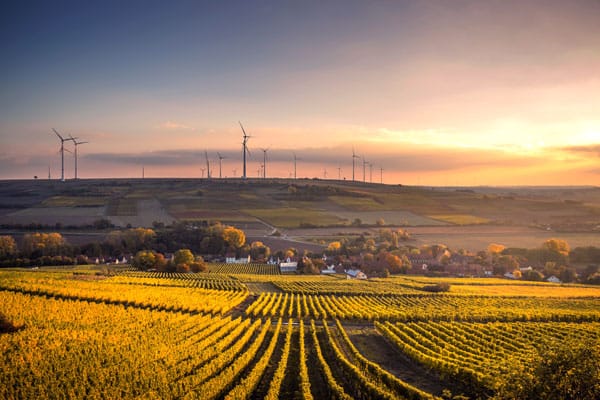
About
Knowledge Base
Customer Care
Contact Us
- Regarding your order
- 0800 9804 992
- info@vintageroots.co.uk
- Trade Enquiries
- 0118 932 6566
- trade@vintageroots.co.uk
By shopping with Vintage Roots you confirm you are over 18 years of age. You may be asked to provide ID on receipt of delivery.

Keeping up with all things sustainable is important to what we do and believe in. Vintage Roots would not have entered into the wine business back in 1986 if it hadn’t have been for our passion and belief in what we felt was the way forward, which was, and still is, organic and biodynamic wines. Our company, along with a few other early starters, have certainly helped create ‘the case for organic’ across the drinks industry. It has become commonplace these days (at last!) for your local shop or restaurant to carry a few organic wines, or even specialise in them. So now, folk are asking ‘is organic enough’? It is right to ask ‘what’s next’ and ‘what more can we do’?
As a relatively small business, we have always tried to ‘do it our way’ by running things along ethical and sustainable lines. Since the start, all of our selection (just wines in those days) has been certified organic and/or biodynamic. In our book, this already is helping reduce carbon outputs from vineyards, reduce pollution in our waterways and broader environment, as well as help nature, increase biodiversity and protect the health of vineyard workers too.
We recognise that our business and the choices we make can have a significant impact on the environment. From energy usage, to greenhouse gas emissions, the creation of waste and more, there’s always plenty to think about. Apart from only supplying organic products (which have a lower eco footprint to begin with), we aim to run our business as ethically as possible.


Read our full Environmental Policy here.
Long ago, since 2005, we decided to carbon offset all emissions for our wine, beer, spirits and other drink imports from around the world by road or ship (none of our wines are air freighted), whether they came from northern France or as far as New Zealand. Though offsetting is seen as being far from perfect, it is at least something, and over time we have become more savvy over the choice of offset scheme.
Offsetting means buying carbon credits equivalent to your carbon impact. So, for every tonne of CO2 we emit by running our business (not only for wine transport, but also staff travel, company vehicles, forklifts, power, etc known as Scope 1 & 2 emissions ), there is one tonne less emitted into or removed from the atmosphere. Most recently for our offsetting, we partnered with ‘Ecologi’ verified afforestation, reforestation and revegetation projects to fund carbon removal through afforestation in Brazil. The project, which is accredited by the Verified Carbon Standard, is based on changing the use of land from extensive, low productivity cattle ranching to a sustainable forest system.
In an ideal world (long way to go!), we would also tackle our Scope 3 emissions (from activities not directly controlled by us, for example the glass bottles for wine, and the onward deliveries to all of you, our customers). Though we have started to measure and report on this scope, we cannot as yet afford to offset this large amount, and be able to sustain the running of our business.
We continue to commit to always using 100% recycled paper for any of our printing, and reduce the amount of paper we use. Our Vintage Roots boxes, which hopefully you safely receive your organic wines in, are made from a minimum of 70% recycled materials, with the rest being FSC approved. All tape we use is paper rather than plastic. We deploy sound waste management practices and stubbornly insist that all cardboard, paper and glass is segregated and dispatched for recycling.
Everything we import and buy within the UK, has a final destination at shops or restaurants, or the consumer at home. There is a lot of glass, paper, wood and more in the Packaging and Vintage Roots complies with the requirements of the Producer Responsibility Obligations (Packaging Waste) Regulations. We work with our data partners ERP UK and compliance partners Biffa to ensure we comply with all relevant laws including the new Plastic Tax and Producer Responsibility regulations. We do this by working with ERP UK to analyse our data and Biffa to purchase Packaging Recovery Notes (PRNs) to offset our obligations.
Purchasing of PRNs is a funding mechanism which will allow Vintage Roots to contribute back to the recycling industry to offset the waste we produce in our business operations, funding areas such as new recycling equipment or help financing recycling waste collections, including road-side wheelie bins. By doing this Vintage Roots is committed to ensuring our responsibility as a Waste Producer is taken seriously and we can help contribute to a sustainable future.
This last year we have undertaken to question all suppliers further to identify what extra steps they in turn are taking for the environment beyond organic/biodynamic. We ask about glass bottle weights, the percentage of recycled materials for their packaging, etc. Truthfully, we do not always get the amount of detail, or fully completed questionnaire forms returned that we would like. However, as with all initiatives, it takes time, and we want to be able to make the best choices with the best suppliers, to serve you our customers, who rightly demand better environmental traceability. The more questions being asked the better.
In our market sector, we sometimes hear talk and concern over ‘wine miles’ – i.e. how far a wine travels from producer to consumer and its associated effect on the environment. Hence, back in 2007, Vintage Roots commissioned a study to reveal the true carbon footprint of all its wine imports, using a specialist leading carbon company called Carbon Clear at the time. We never transport any wine by air freight, it travels by road or ship and sometimes partly via rail. The results were interesting and show that a longer distance travelled by ship is not as damaging as lots of shorter trips by lorry or truck. Buying a bottle of wine shipped from South Africa, for example, can carry a lesser carbon footprint than for a wine driven from southern Italy by truck.
When we say ‘vine to lips carbon offsetting’ it’s not strictly 100% accurate and we’re referring to the journey of the wine from the vineyard (once bottled) all the way to our distribution warehouse in the UK. The term doesn’t relate to the wine itself, or each individual ‘jaunt’ a bottle may take around the UK, or elsewhere, before you, our customer decides to drink and enjoy it. Unfortunately, we could never be that accurate, and the way carbon is measured is always being refined and improved. This said, what we are doing to calculate our emissions and carbon offset using the best found schemes feels like a worthwhile step in the right direction, and in our opinion it’s certainly better than doing nothing in this regard.
Whether you’re buying simply because you love the taste of organic wines, the absence of chemical residues in them or because you support the way we run our business, we value all our customers, and thank you for entrusting us to be your wine and drink supplier. We want everyone to ‘think and drink organic’ because we believe it’s better for you and the planet, and we’ll always strive to run an ethical and environmentally led business.


~Neil & Lance, Founders & Directors
Read our full Environmental Policy here.
Read our full Philanthropy Policy here.
Receive Vintage Roots updates, discounts and offers via email